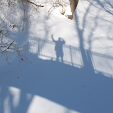Also on the map is a row of brick buildings that were used for storage. Two of those buildings remain, and the ruins of two others are still visible. I think the one on the right is still used for storage. On the map it says that it and the next building were FURNE WARE HO, which probably is furniture warehouse. I recall someone telling me several years ago that the Fendig Summer Theater used it. The smaller building on the right has a TV dish and a mailbox, so it seems to be currently used as a residence. It must be dark inside because it seems to lack windows. On the map it is identified as GENL. STGE CEMT. FLOOR.

The space between these two buildings clearly had, at one time, another building.

And there was also clearly another building to the north of the the smaller building. the brickwork looks like it was meant to be interior, not exterior.
Anyone know more about the history of these odd buildings?





No comments:
Post a Comment